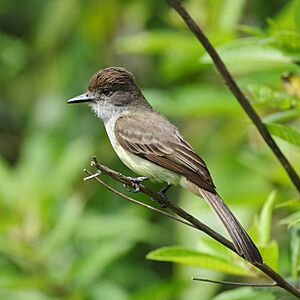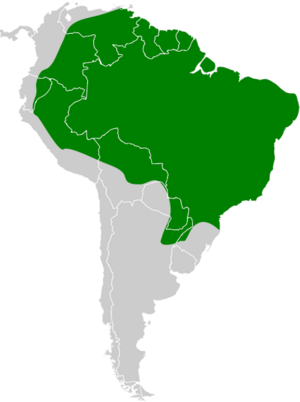Short-crested flycatcher facts for kids
Quick facts for kids Short-crested flycatcher |
|
|---|---|
 |
|
| at Bertioga, São Paulo State, Brazil | |
| Conservation status | |
| Scientific classification |
|
| Kingdom: | Animalia |
| Phylum: | Chordata |
| Class: | Aves |
| Order: | Passeriformes |
| Family: | Tyrannidae |
| Genus: | Myiarchus |
| Species: |
M. ferox
|
| Binomial name | |
| Myiarchus ferox (Gmelin, 1789)
|
|
 |
|
| Script error: The function "autoWithCaption" does not exist. | |
Script error: No such module "Check for conflicting parameters".
The short-crested flycatcher (Myiarchus ferox) is a cool bird that belongs to the Tyrannidae family. This family is often called the "tyrant flycatcher" family because many of its members are quite bold.
You can find this bird in many countries across South America. These include Argentina, Bolivia, Brazil, Colombia, Ecuador, French Guiana, Guyana, Paraguay, Peru, Suriname, Uruguay, and Venezuela.
These flycatchers love to live in certain places. Their favorite spots are warm, wet lowland forests in tropical or subtropical areas. They can also be found in places where forests used to be, even if they are now a bit changed.
About This Bird's Name and Family
Every living thing has a scientific name, which is like a special code name that scientists all over the world use. The short-crested flycatcher's scientific name is Myiarchus ferox.
Who Named It?
This bird was first officially described in 1789 by a German scientist named Johann Friedrich Gmelin. He gave it the name Muscicapa ferox. The word ferox comes from Latin and means "brave" or "fierce." This name might have been chosen because of the bird's bold nature.
Later on, in 1844, another scientist named Jean Cabanis placed this bird into a new group, or genus, called Myiarchus. There are about 22 different types of flycatchers in the Myiarchus genus today. The short-crested flycatcher is closely related to the Panama flycatcher.
Different Types of Short-Crested Flycatchers
Just like people can have different looks depending on where they are from, some bird species have slightly different types, called subspecies. The short-crested flycatcher has three main subspecies:
- M. f. brunnescens: You can find this type in northeastern Colombia and southwestern Venezuela.
- M. f. ferox: This is the most common type, found across the Amazon rainforest area.
- M. f. australis: This type lives from eastern Bolivia all the way to central and southern Brazil, Paraguay, Uruguay, and northeastern Argentina.
 | James Van Der Zee |
 | Alma Thomas |
 | Ellis Wilson |
 | Margaret Taylor-Burroughs |


